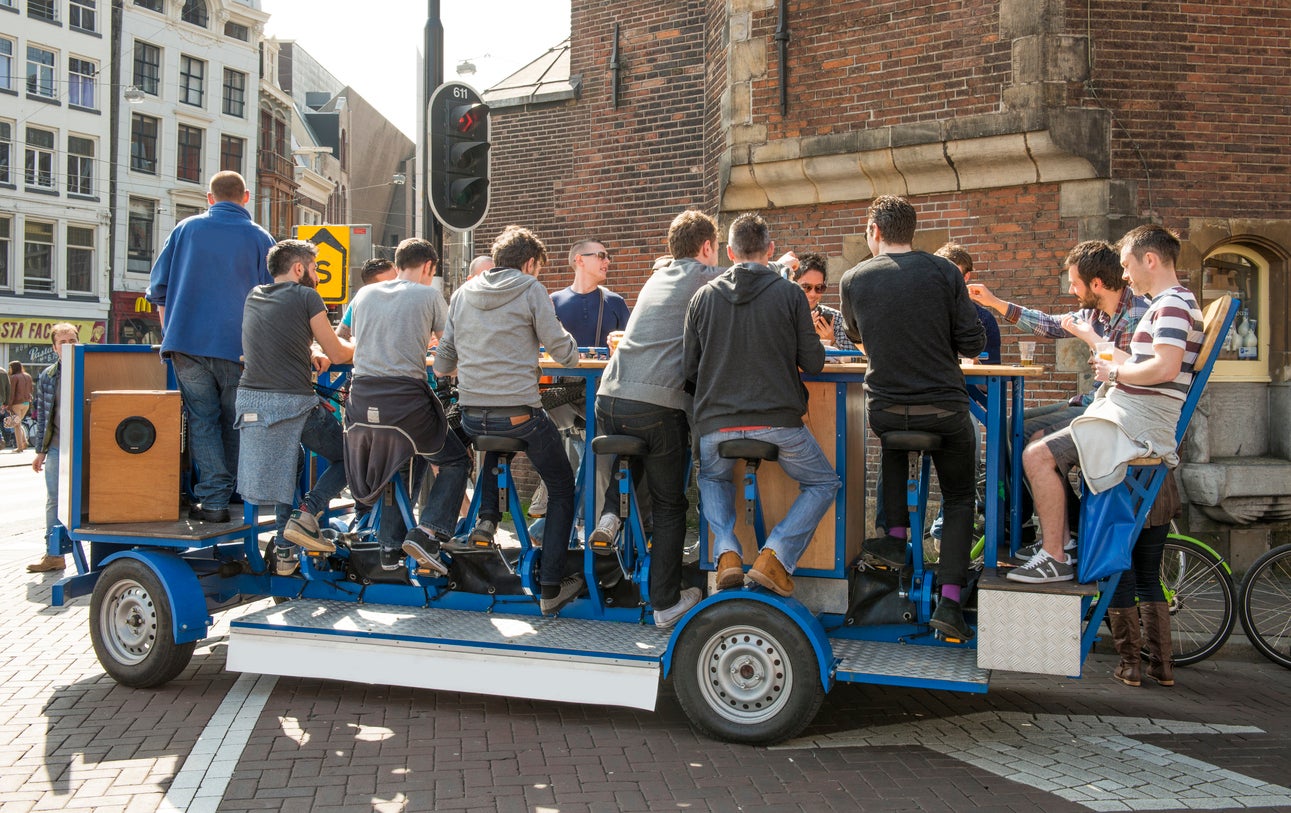Amsterdam bans ‘nuisance’ beer bikes from city centre
The popular stag do activity is off the table

Your support helps us to tell the story
This election is still a dead heat, according to most polls. In a fight with such wafer-thin margins, we need reporters on the ground talking to the people Trump and Harris are courting. Your support allows us to keep sending journalists to the story.
The Independent is trusted by 27 million Americans from across the entire political spectrum every month. Unlike many other quality news outlets, we choose not to lock you out of our reporting and analysis with paywalls. But quality journalism must still be paid for.
Help us keep bring these critical stories to light. Your support makes all the difference.
Amsterdam has banned beer bikes in the city centre as of 1 November, reports CNT.
The practice of cycling through the city on a bierfet – a bar on wheels surrounded by bike seats which tourists pedal along while drinking – was invented in the Netherlands in 1997 and has long been popular with visiting stag and hen parties.
However, in 2016 a petition begging Amsterdam city council to outlaw the “terrible phenomenon” garnered thousands of signatures. Amsterdam District Court stated that “the beer bicycle may be banned from the city centre to stop it from being a nuisance,” and on Tuesday 31 October a ruling was passed by judges to enforce the ban, or bierfietsverbod.
The ruling called the beer bikes a "public order problem", adding: "The combination of traffic disruptions, anti-social behaviour and the busy city centre justifies a ban."
The Independent recently reported on Amsterdam’s decision to deal with over-tourism in increasingly innovative ways. Rather than turn visitors away, the emphasis is on introducing them to lesser-visited areas and attractions, while also appealing to more discerning travellers rather than those who are coming to drink heavily and take advantage of the city’s more flexible drug and prostitution laws. The beer-bike ban could fit into the greater aims of attracting a different kind of tourist.
“We’re an open, tolerant city,” tourism chief Geerte Udo told CNT. “How can you ever imagine us saying ‘You’re not welcome here!’?”
Udo and the i amsterdam team, which oversees the city’s tourism, have spent the last two years trying to subtly move tourists away from the most popular attractions, such as the Red Light District and Museum Quarter. They used the data stored on the chip inside Amsterdam’s City Card, which gives access to various attractions and free public transport, to analyse tourist behaviour and devise ways of changing it to ease congestion.
“We can see exactly how these people behave,” said Udo. “Everybody comes to the city and goes to the Van Gogh Museum in the morning, and [takes] a canal boat in the afternoon.”
The team then attempted to switch up this pattern, for example by suggesting people take a boat ride in the morning to avoid the crowds when they bought their City Card. Another scheme involved displaying a live feed showing the queue at the most popular places, such as the Van Gogh Museum, to encourage visitors to plan their trip for later in the day or plump for another destination altogether.
An AI-powered service for Facebook Messenger is also in the works; it will scrape a person’s profile and then come up with interesting things to see and do in the city based on their posts and likes. Currently only available in Dutch, an English version is expected to be ready by late 2018.
“You cannot close a city,” said Udo. “It’s such a short-term solution.”
She added: “You have to make solutions for the future to cope with the local world.”
Join our commenting forum
Join thought-provoking conversations, follow other Independent readers and see their replies
Comments